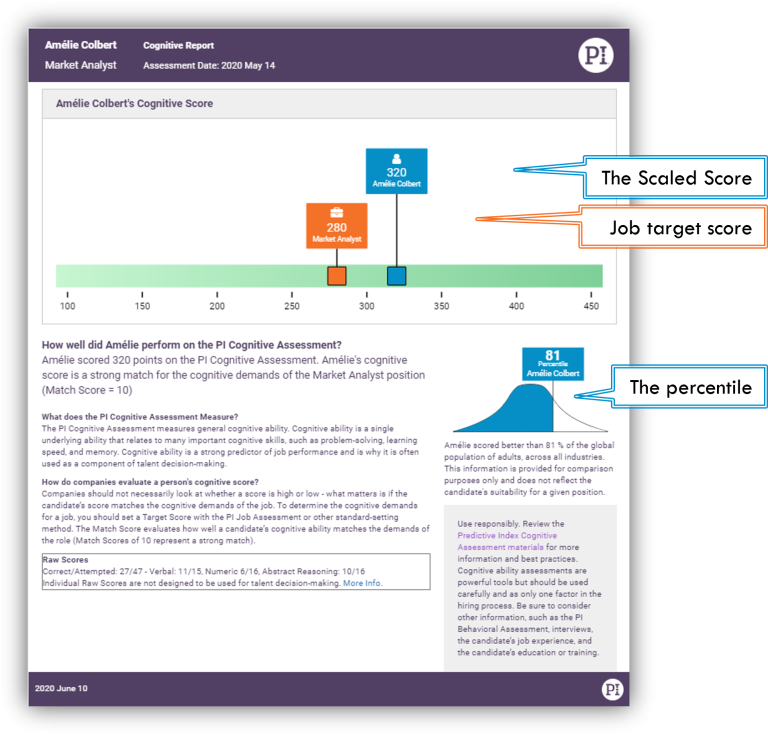
How to Interview With The Predictive Index
Learn how hiring with The Predictive Index changes interviews by defining the role first, using assessments earlier, and reducing risk before decisions are made.
Reading Time: 10 minutes
When it comes to hiring and developing the best talent for your business, understanding an individual’s cognitive abilities – their capacity to think, learn, and solve problems – is just as crucial as assessing their skills or experience. This is where The Predictive Index Cognitive Assessment™ (PICA) comes into play, offering a window into one of the most critical aspects of potential job performance: general cognitive ability.
In this post, we will delve into the world of PICA, a tool specifically designed to measure an individual’s general cognitive ability, which is a key predictor of their ability to acquire new knowledge, adapt to change, and excel in complex and challenging environments. Whether you’re hiring for a fast-paced start-up, a growing SME, or a large enterprise, understanding how PICA works and how it can be applied in your hiring and talent management processes is invaluable. Let’s explore how this tool can help you save time and money by making smarter hiring decisions, ultimately ensuring that your next hire is the right hire.
The Predictive Index Cognitive Assessment™, often abbreviated as PICA, is a fundamental instrument in the world of talent recruitment and development. Its primary function is to measure an individual’s general cognitive ability, a key determinant in predicting job performance and adaptability across various professional settings.
Defining PICA
Cognitive Ability in the Workplace
The Predictive Index Cognitive Assessment™ transcends the bounds of a typical intelligence test. It is a refined tool that forecasts how effectively an individual will perform in a job by examining their fundamental cognitive skills. Recognising these skills is vital for making informed recruitment decisions and ensuring that the talent you introduce into your organisation is equipped to meet the cognitive demands of their positions.

You May Also Be Interested In
Discover the art of crafting an impactful LinkedIn profile for executives in 2024 with this latest guide …
General cognitive ability, often symbolized as ‘g’, is a crucial concept in understanding the potential of employees and candidates in the workplace. It refers to the core mental capabilities that influence how we learn, solve problems, and understand complex information.
Why ‘g’ Matters
‘g’ in Different Work Environments
Linking ‘g’ to Recruitment and Development
General cognitive ability is a fundamental aspect of human capital in any organisation. By measuring and understanding ‘g’, businesses can make more informed decisions about hiring and developing their workforce, ensuring they have the right people in place to meet both present and future challenges.

Getting to grips with how The Predictive Index Behavioral Assessment™ functions is key to unlocking its full potential in your recruitment and team management strategies. Here’s a step-by-step breakdown of the process:
Understanding the mechanics of The Predictive Index Cognitive Assessment™ (PICA) is key to effectively utilizing it in your recruitment and talent management processes. Let’s break down how this assessment functions:
Assessment Structure
Interpreting the Results
Categories and Subcategories
Application in the Workplace
The Predictive Index Cognitive Assessment™ offers a nuanced and comprehensive assessment of an individual’s cognitive capabilities. It serves as a critical tool in making informed hiring decisions, ensuring that candidates are not only capable of performing their current job roles but are also equipped to handle future challenges and growth opportunities.


Incorporating The Predictive Index Cognitive Assessment™ (PICA) into recruitment and talent management strategies offers a range of benefits that can significantly enhance the effectiveness and efficiency of these processes. Let’s explore the key advantages:
Enhanced Hiring Precision
Strategic Talent Management
Improved Job Fit and Employee Retention
Data-Driven Decision Making
Enhancing Organisational Performance
Incorporating The Predictive Index Cognitive Assessment™ into your recruitment and talent management processes can thus lead to more informed, data-driven decisions. It not only enhances the precision of your hiring practices but also contributes to building a more adaptive, high-performing, and cohesive workforce.

Implementing The Predictive Index Cognitive Assessment™ (PICA) in the workplace can have a transformative impact on various aspects of human resource management. PICA is a versatile tool that can be effectively used across various aspects of HR management. From refining recruitment strategies to enhancing team performance and driving personal development, PICA offers valuable insights that can lead to a more engaged, productive, and satisfied workforce. Here are some practical ways in which PICA can be applied:
Streamlining the Recruitment Process
Optimising Team Composition
Facilitating Employee Development
Enhancing Leadership Development
Improving Employee Engagement and Satisfaction
Incorporating The Predictive Index Cognitive Assessment™ (PICA) into your business strategies represents a significant step towards optimising your human resources. By providing a deeper understanding of an individual’s cognitive abilities, PICA not only enhances the recruitment process but also plays a pivotal role in shaping a productive, adaptive, and cohesive workforce.
Key Takeaways
The Bigger Picture
As we navigate the complexities of the modern workplace, tools like The Predictive Index Cognitive Assessment™ become invaluable in making informed decisions that impact the growth and sustainability of our businesses. Embracing PICA is not just about enhancing hiring and management processes; it’s about fostering a culture of growth, adaptability, and continuous improvement.
So, as you look towards making your next hire or developing your current team, consider the power of understanding cognitive abilities with PICA. It’s an investment in your people, your greatest asset, and in the future success of your business.
You May Also Be Interested In
Explore the transformative impact of The Predictive Index Behavioral Assessment™ in enhancing hiring accuracy, team dynamics, and leadership effectiveness. Learn how this tool offers deep insights into workplace behaviors, driving smarter decisions and fostering a more productive and harmonious work environment
From supporting the growth of leading pharma companies over the past 10 years, I have learnt that when it comes to predicting future performance, technology is key:
For me, hiring without the use of psychometric assessments is like trying to put together a jigsaw puzzle with pieces missing … and no picture on the box. It’s not fun, it takes longer, and when you are almost finished, you realise you have pieces missing.
Take the assessment today and start measuring more to improve your recruitment.
If you are interested in learning more or are ready to incorporate behavioral data into your recruitment process, please contact me today, I will be happy to help.
Let’s get started!
Dave Crumby
Founder at 360 Talent Solutions
Certified Predictive Index Practitioner


Learn how hiring with The Predictive Index changes interviews by defining the role first, using assessments earlier, and reducing risk before decisions are made.

A bad hire in a high-risk role is a cost you cannot afford. Discover how to use data to find a “safe pair of hands” and build a zero-error culture.

Discover the best alternatives to DiSC for recruitment with a clear, evidence led guide. Learn which assessment providers offer reliable, job linked insight to support fair and consistent hiring decisions.

Discover how Swiss biotech companies can align hiring with business goals using data-driven people insights from The Predictive Index.
| Cookie | Duration | Description |
|---|---|---|
| cookielawinfo-checbox-analytics | 11 months | This cookie is set by GDPR Cookie Consent plugin. The cookie is used to store the user consent for the cookies in the category "Analytics". |
| cookielawinfo-checbox-functional | 11 months | The cookie is set by GDPR cookie consent to record the user consent for the cookies in the category "Functional". |
| cookielawinfo-checbox-others | 11 months | This cookie is set by GDPR Cookie Consent plugin. The cookie is used to store the user consent for the cookies in the category "Other. |
| cookielawinfo-checkbox-necessary | 11 months | This cookie is set by GDPR Cookie Consent plugin. The cookies is used to store the user consent for the cookies in the category "Necessary". |
| cookielawinfo-checkbox-performance | 11 months | This cookie is set by GDPR Cookie Consent plugin. The cookie is used to store the user consent for the cookies in the category "Performance". |
| viewed_cookie_policy | 11 months | The cookie is set by the GDPR Cookie Consent plugin and is used to store whether or not user has consented to the use of cookies. It does not store any personal data. |